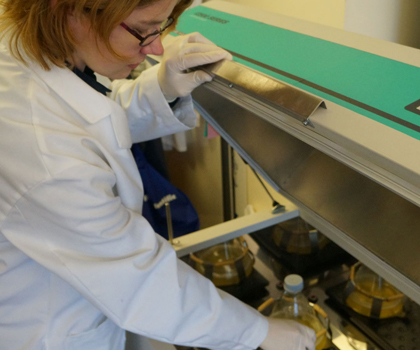University of Vermont Cellular, Molecular and Biomedical Sciences graduate student Jessica Sheehe has come to know all of the quirks of a protein called PKG: She’s responsible for expressing and purifying PKG in the lab and ensuring that the billions of insect cells tricked into producing this protein remain healthy.

Jessica Sheehe, Cellular, Molecular, and Biomedical Sciences graduate student (Photo: COM Design & Photography)
University of Vermont Cellular, Molecular and Biomedical Sciences graduate student Jessica Sheehe has come to know all of the quirks of a protein called PKG: She’s responsible for expressing and purifying PKG in the lab and ensuring that the billions of insect cells tricked into producing this protein remain healthy.
It is an important job, as her lab, run by UVM Professor of Pharmacology Wolfgang Dostmann, Ph.D., is one of very few in the country able to make PKG, and its production has proven useful for several important findings. One such discovery was recently granted a patent and shows promise as a platform to explore novel pharmaceutical therapies for hypertension – a major risk factor for cardiovascular and kidney disease that affects roughly one in three people in the United States.
Now a fourth-year doctoral student, Sheehe’s thesis will explore the different mechanisms by which PKG gets activated in the cell. Understanding how this protein works at a very basic level may lead to additional therapeutic targets in the future.